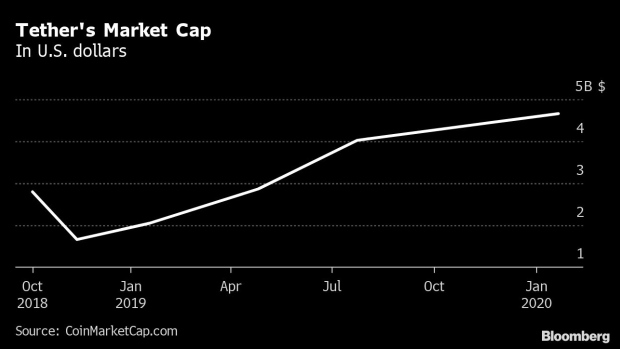Jan 22, 2020
Crypto Stablecoins Find a Toehold in Shadows of Global Trade
, Bloomberg News

(Bloomberg) -- A controversial type of cryptocurrency is gaining in popularity among some small merchants operating in the shadows of mainstream commerce.
Businesses such as importers and exporters of goods ranging from baby products to furniture in Asia and Europe are using so-called stablecoins including Tether and USD Coin, according to payment processors and over-the-counter trading desks.
Transactions with suppliers and vendors already reach up to $10 million a day at Singapore-based QCP Capital, which caters to such clients. At payment-services provider B2BinPay, transactions already account for millions of dollars a month, and are increasing daily, said the Moscow-based company.
Stablecoins can let parties settle some transactions faster than via the traditional banking system, which many firms still lack access. They also can provide the prospect of avoiding government capital controls and oversight. Their use is growing as China explores issuing its own cryptocurrency, and the U.S. maintains tariffs on many Chinese goods.
“They are just using this as an alternative to banks,” said Darius Sit, managing partner at QCP Capital. “This is crypto going back to its roots.”
Bitcoin, the world’s largest cryptocurrency, was created to let people transact without involvement from traditional banks regulated by governments. But it’s highly volatile -- which is why stablecoins, whose values are usually linked to underlying assets such as reserves, have taken hold over the last two years.
“The users are not necessarily believers in the long-term value of crypto, just that it will retain value long enough to settle the transaction,” said Aaron Brown, an investor and a writer for Bloomberg Opinion.
Tether has been one of the most controversial cryptocurrencies, with the founders embroiled in a lawsuit with New York state over reserves. It has also been plagued by allegations of market manipulation. Despite all the contention, Tether has been among the fastest growing coins in terms of use.
“Undoubtedly, one can see how using the most liquid, most trusted and fastest stablecoin vastly improves payment times across many businesses, resulting in additional opportunities for growth,” said Paolo Ardoino, chief technology officer for Tether and the crypto exchange Bitfinex.
Another attraction of stablecoins is the finality of any activity.
“As you know, transactions conducted in blockchain are irreversible, so they cannot be canceled, rejected or confiscated,” said Genvieve Iugrinov, a product manager at B2BinPay. “This is why it’s a more convenient way to pay for goods and services.”
In other nations such as Indonesia, businesses often prefer more regulated stablecoins, such as USD Coin, which are issued by U.S.-regulated financial institutions and audited every month, Sit said.
“Stablecoins are perfectly suited to these gray market business models involving cross-jurisdiction transfers, in areas where the financial sector might not be trustworthy or simply inefficient,” said Nic Carter, co-founder of Boston-based crypto market tracker Coin Metrics.
To contact the reporter on this story: Olga Kharif in Portland at okharif@bloomberg.net
To contact the editors responsible for this story: Jeremy Herron at jherron8@bloomberg.net, Dave Liedtka, Rita Nazareth
©2020 Bloomberg L.P.





